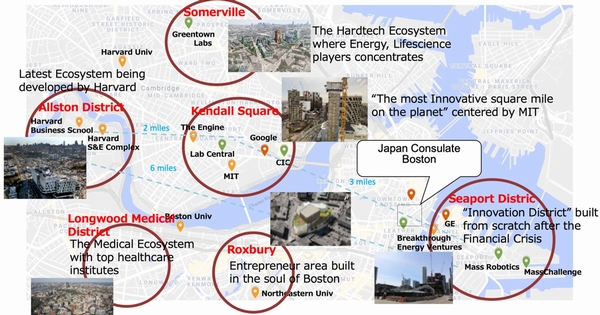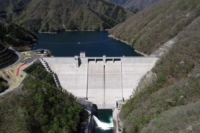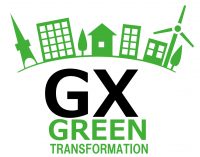
The heart of the Boston innovation hub is Kendall Square, considered “the most innovative square mile on the planet.” Kendall Square, adjoining MIT’s Engineering and Management Schools, is home to a wide array of advanced biomedical research labs, global pharmaceutical companies, the LabCentral life science incubator, the AI Institute, and the headquarters of Microsoft, Google, Amazon and Cambridge Innovation Center. Nearby is The Engine, a one-of-a-kind DeepTech incubator that exclusively invests in and houses emerging startups developing breakthrough solutions in quantum computing, long-duration storage, sustainable manufacturing, carbon capture, and biomedical therapies. Across the Charles River is the Seaport District, formerly a dilapidated warehouse district, now home to the state’s sponsored accelerator, MassChallenge. The Seaport District serves as a cluster for robotics startups, MassRobotics and many tech-focused legal and consulting firms. Immediately west next to Fenway Park, is the Longwood Medical area, where major research hospitals run field studies on new drugs and medical therapies. Back across the Charles River, just north of Kendall Square, is the largest and oldest climate technology incubator, Greentown Labs, founded in 2011. Greentown Labs has been home to over 600 cleantech startups that collectively have raised over $6 billion in capital. Greentown Labs also opened a second incubator facility in Houston, Texas, to tap into the expertise and connections of the Oil & Gas industry, with the goal of decarbonizing hard-to-abate industries and accelerating our transition to a low-carbon future.
While Boston is pulsating with innovation, it does not operate in isolation. Boston is a short distance from equally important cities with rich array of tech startups. New York City, ranked #2 in the Global Startup Ecosystem Report 2024 , has over 25,000 startups and has seen over $165 billion in venture funding since 2021. The New York metro area has a high concentration of startups in fintech, business software, lifesciences, and is home to a number of urban pilot projects. West of Boston, in upstate New York, lies Rensselaer Polytechnic Institute (RPI). RPI has installed a state-of-the-art IBM quantum processor, making it the first utility-scale quantum computer that potential position upstate New York as “Quantum Valley.”
Immediately south of Boston, Connecticut has a concentration of startups and industrial companies in fuel cell manufacturing, sustainable materials, and energy storage, supported by the Connecticut Center for Advanced Technology (CCAT). Earlier this year, Yale University launched the newest climatetech incubator, ClimateHaven in New Haven. Across the Canadian border, lies the Toronto-Waterloo innovation corridor. The MaRS Innovation District, located in downtown Toronto, calls itself the world’s largest urban innovation hub. MaRS has 12,000 affiliated Canadian startups in life sciences, AI, and transformational technologies. Given Boston’s proximity to these ecosystems, there is a free flow of talent, academic and industrial collaborations.
Back in 2008, the state’s governor enacted the Massachusetts Life Sciences Act, offering $1 billion to boost the state’s leadership in biomedical research. As a result, today Boston is the global mecca for life science research with over $7.7 billion invested in new startups in just 2023. All of the largest and most famous pharmaceutical companies have setup R&D centers in or near Kendall Square.

















